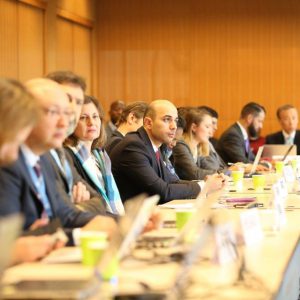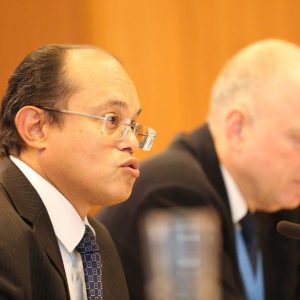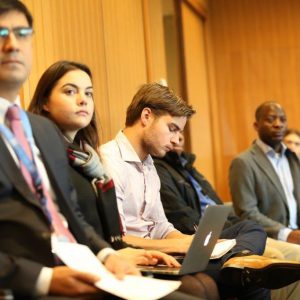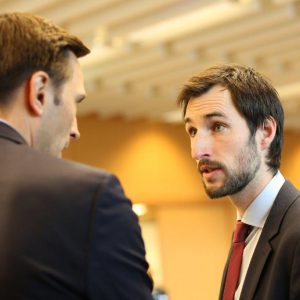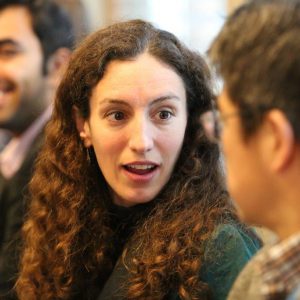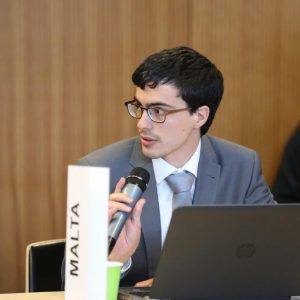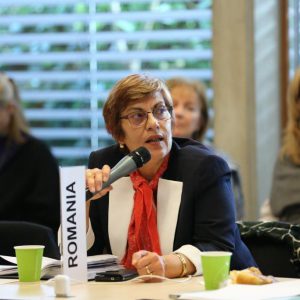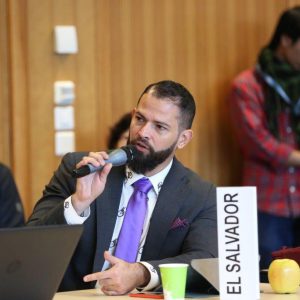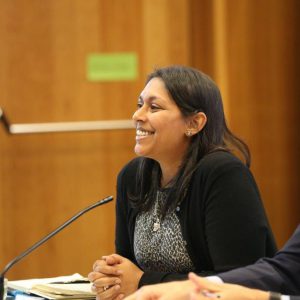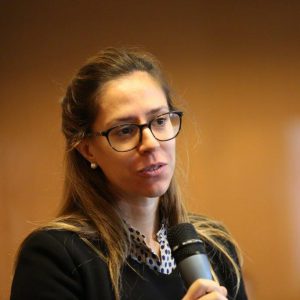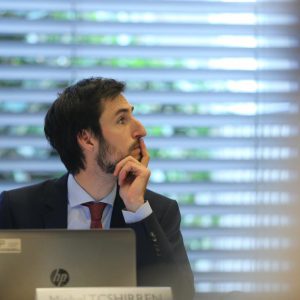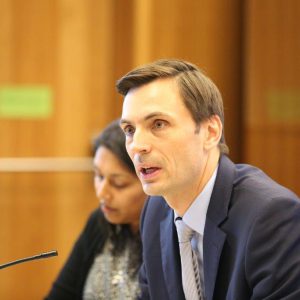Événement Conférence
Chemicals and Waste Briefing

30 Nov 2016
10:00–12:00
Lieu: International Environment House II (7-9 ch. de Balexert)
Organisation: Geneva Environment Network
A briefing focusing on the outcomes of recent negotiations and preparation of upcoming meetings related to chemicals and waste took place at the International Environment House on Wednesday 30 November 2016. This event was organised within the framework of the Geneva Environment Network and moderated by Achim HALPAAP, Head, Chemicals and Waste Branch at UN Environment and Rolph PAYET, Executive Secretary for the Basel, Rotterdam and Stockholm Conventions Secretariat.
Agenda
10:00
Coffee & Tea
10:15
Welcome and Introduction
Achim HALPAAP, Head, Chemicals and Waste Branch, UN Environment
Rolph PAYET, Executive Secretary, Basel, Rotterdam and Stockholm Conventions Secretariat
10:20
1st Meeting of the Intersessional Process for SAICM and Sound Management of Chemicals Beyond 2020 (Brasilia, February 2017)
Jacob DUER, Principal Coordinator, Interim Sec. of the Minamata Convention and SAICM Sec.
10:35
1st Meeting of the Global Chemicals Outlook II Steering Committee (Geneva, December 2016)
Pierre QUIBLIER, Programme Officer, Chemicals and Waste Branch, UN Environment
10:50
2nd Executive Board Meeting of the Special Programme (Bangkok, October 2016)
Nalini SHARMA, Programme Officer, Chemicals and Waste Branch, UN Environment
11:05
Preparation of the Basel, Rotterdam, and Stockholm Conventions COP Meetings (Geneva, April-May 2017)
Kerstin STENDAHL, Deputy Executive Secretary, Basel, Rotterdam and Stockholm Conventions Secretariat
11:20
Minamata Convention and the Swiss Offer to host the permanent Secretariat in Geneva
Michel TSCHIRREN, Chemicals focal point, Global Affairs Section, Swiss Federal Office for the Environment
11:30
Questions and comments
12:00
Closing
Summary
WELCOMING REMARKS
Achim HALPAAP opened the session by welcoming all the panellists, thanking the Swiss government for their continuous support to the Geneva Environment Network and said they looked forward to a constructive discussion.
While 2016 was a busy year, 2017 will be even busier with key events coming up.
- The 3rd United Nations Environment Assembly (UNEA3) is already being planned (December), and its priorities have just been defined.
- The triple COPs of the Basel, Rotterdam and Stockholm Conventions (BRS MEAs) will meet in April-May.
- The first meeting of the COP for the Minamata Convention will probably take place in September.
Rolph PAYET also came back on the fact that 2016 was a very busy year in the chemicals sector, numerous meeting have been held, and 2017 will be equally demanding. He mentioned that UN Environment and MEAs door remains open to discuss with delegations how we can make the BRS MEAs triple COPs a success.
Achim announced they would now attack the first point on the agenda, which is the first meeting of the intersessional process of the strategic approach for chemicals management. The fourth international conference on chemicals management (ICCM4) in September 2015 provided a mandate to governments, stakeholders and international bodies to discuss where do these actors want to take chemicals and waste management beyond the 2020 goal that was enshrined in the outcome of the World Summit on Sustainable Development in 2002. A lot of preparatory thinking has been going on at the global level. The first inter sessional meeting is coming up soon.
1st MEETING OF THE INTERSESSIONAL PROCESS FOR SAICM AND SOUND MANAGEMENT OF CHEMICALS BEYOND 2020
Jacob DUER, Principal Coordinator and Interim Secretary of the Minamata Convention and SAICM Secretary, then took the floor. In addition to the Basel, Rotterdam and Stockholm (BRS) Conventions COPs and the Minamatar COP that will take place next year, 2017 will also be the year of the first Meeting of the Intersessional Process for SAICM and Sound Management of Chemicals Beyond 2020. It will be held in Brasilia in February 2017.
This process was initiated last year in Geneva, at ICCM4, in September 2015. There was a recognition by stakeholders, governments, civil societies and members of the industry to start addressing this issue in the broader context beyond 2020. The conference thus adopted the resolution “beyond 2020 process” and noted the importance of both having a multi-sectorial voluntary approach and involving a broader group of participants – and not only governments. As it takes time to arrive at a new policy framework and no further international conferences meeting are planned before 2020, finding good solutions for the “beyond 2020 process” implied that the discussion needed to be engaged as soon as possible.
Three meetings will be held in total. The first one will occur in February 2017 in Brasilia, on the invitation of the government of Brazil and the minister of the environment. It will consist in a close cooperation with chemical companies and Brazilian associations. A large number of participants is expected – more than 100 – and according to the SAIMC’s mandate, funding for 30 participants will be made available. The registration deadline was on the 25 November for funded participants, and is still open for those not seeking funding. An agenda has been drafted which will be discussed next week. Dialogues will be organised on key issues during lunch breaks for the sake of informal settings, as well as evaluation focus groups. The ambition level is high. Regional meetings in between 2017 and 2018 will also be scheduled.
The second meeting will be held in early 2018. A working group will be set up by October 2018. Finally, the third meeting will occur by mid-2019; along with regional meetings. The ICCM5 Decision on beyond 2020 will be held around September 2020. By then, concrete recommendations will have been made. This meeting is open to all stakeholders, including industry, civil societies, health, labour and trade actors, among others.
In parallel, an independent evaluation process of SAICM is currently ongoing, a process which has been launched by ICCM4. In this regard, all governments will be asked to respond to a survey. A first interim report will be made available by February 2017 and the final report ready by 2018.
SAICM calls for government and the broader stakeholder community to take part in this process, as it provides a unique opportunity to shape future policies, to nurture future partnerships and to further involve with industries; as well as a first opportunity to discuss the financial base of the process.
Achim added that the three past years were crucial for what has been learnt in the last 20 years managing chemicals and waste. At the Rio Summit in 1992, chemicals and waste were covered in an individual chapter in the Agenda 21, and new conventions such as Rotterdam and Stockholm saw the day in the 90’s. SAICM was then established in 2006. Today, chemicals and waste is a part of the Sustainable Development Goals (SDGs) and of the 2030 Sustainable Development Agenda. In this regard, Achim wondered, how do we look at lessons learnt from the past to shape future policies?
1ST MEETING OF THE GLOBAL CHEMICALS OUTLOOK II STEERING COMMITTEE
Pierre QUIBLIER, Programme Officer for the Chemicals and Waste Branch at UN Environment, provided further information on the first meeting of the Global Chemicals Outlook (GCO) II Steering Committee taking place on 15 and 16 December 2016. As the importance of the first GCO has been recognised, it is now time to prepare for the second.
In April 2016, consultative experts met in Geneva to present what could be the process, scoop, item and outline of this upcoming GCO. An information document was submitted to the second UN Environment assembly which recalled the executive director to continue its work on the GCO and to submit by the end of 2018 an update on the GCO, including a summary for policy makers addressing the work carried out in regards with lacking and inadequate data; assessing progress on the 2020 goals; providing information on the development of non-chemical alternatives; making linkages between chemicals and waste and the global waste management outlook; providing scientific inputs and options for implementation of action to reach relevant SDGs; and targets up to and beyond 2020.
In line with this mandate, a regionally, gender, sectorial, competence skills, balanced steering committee has been put together. About 23 participants are expected on 15 and 16 December 2016. Two representatives from each regions will be present, and 14 governments are expected, balanced from developed and developing countries. Representatives from civil societies, the industry and the academic branch and international government organisations will be present. This meeting will discuss what should be the terms of reference for the steering committee, debate how to produce robust information to shape future goals and decide on how to achieve these goals.
Pierre presented the outline of the meeting. The first part will look at the global context, trends and developments related to the productions, use and consumption of chemicals. Release and emissions aspects, concentration issues and health and environment effects will be reviewed. The second part will take a look at how well relevant actors are equipped to reach the defined goals, and which tools and instruments such as risk assessment, risk management, risk reduction and alternative assessment could be used in this regard. The third part will review the conditions and factors needed to enable the best use of these instruments. These will include research and development, technology transfer and micro economics incentives, among others. The final part will look at the options for implementation for relevant SDGs up to and beyond 2020. In parallel, particular attention will be given to communication strategies which make up for an important part of the process. If everything goes as expected with the first committee meeting, around 12 under view papers will be issued and reported to UNEA3. The second meeting in May 2017 will then facilitate reporting for UNEA3.
Finally, Pierre thanked Switzerland, Norway and Sweden for their support, as well as UNITAR for its technical assistance.
2ND EXECUTIVE BOARD MEETING OF THE SPECIAL PROGRAMME
Nalini SHARMA, Programme Officer for the Chemicals and Waste Branch at UN Environment, introduced the Special Programme. This programme was adopted during the first session of the United Nations General Assembly in June 2013. It aims to provide support at the institutional level for the BRS and Minamata conventions. UN Environment was asked to establish the special programme and to provide a secretariat, which is now the Chemicals and Waste branch of UN Environment. The executive board of the Special Programme is the decision making body, composed of five countries from all big world regions.
A first meeting was held in February 2016 and by the 4th of July, applications from 24 countries had already been received. The executive board and secretariat was pleasantly surprised by the participation rate, which clearly demonstrated the commitment of the parties. More recently, a second board meeting was held from 11 to 13 October 2016 in Bangkok and was attended by the five board members: Kenya, Pakistan, Macedonia, Brazil and Yemen. The donors were the European Union, Finland, Germany, Sweden and the United States. Observers were present, from various governments, UN Environment, UNITAR, BRS MEAs Secretariat, Minamata Secretariat and WHO.
Seven projects up to an amount of 1.75 million US dollars were lunched for the following countries: Benin, Tanzania, Iraq, the Czech Republic, Ukraine, Argentina and the Dominican Republic. Implementation arrangements are currently being discussed with the board. A second round of applications will be launched for January 2017. Guidelines and forms will then be made available. The board also provided a stronger mandate to the secretariat. There will be a third board meeting by the end of October 2017.
Regarding pledges and contributions, the board currently has a total budget of 17 million, and has to thank Australia, the European Union, Finland, Germany, Norway, Sweden, the Netherlands and the United States. The board recommended other governments in the position to do so to contribute to the programme.
PREPARATION OF THE BASEL, ROTTERDAM, AND STOCKHOLM CONVENTIONS COP MEETINGS (GENEVA, APRIL-MAY 2017)
Kerstin STENDAHL, Deputy Executive Secretary for the Basel, Rotterdam and Stockholm (BRS) Conventions Secretariat, gave information regarding the preparation of the BRS MEAs COP meetings which will be held in Geneva in April-May 2017, under the theme ‘A future detoxified: Sound management of chemicals and waste’. It will be the third time a back to back COPs will be organised, with all three COPs coming together during two weeks, effectively bringing together 1,500 participants from 185 Parties. Before this event takes place, regional meetings will be held in March 2017. These meetings will allow the parties to prepare for the COPs by coming together and having a chance to look at the documents and agenda of the meetings. Kerstin then provided further information on logistics (registration, organisation of work, schedule and contacts) which can be found in her presentation at the bottom of this page.
MINAMATA CONVENTION AND THE SWISS OFFER TO HOST THE PERMANENT SECRETARIAT IN GENEVA
Michel TSCHIRREN, the Chemicals focal point for the Global Affairs Section at the Swiss Federal Office for the Environment, introduced the Swiss Offer to host the permanent Secretariat of the Minamata convention in Geneva. He first explained that chemicals and waste management had always been a priority in Swiss policies. Together with Norway, Switzerland has proposed to establish a legally binding agreement on mercury in 2003, which led to an agreement in 2013. Switzerland has kept a high commitment during this process and, in this regard, has offered last year to host the conference of the Minamata convention. Switzerland looks forward to the first meeting of the COP of the Minamata convention on 25 September 2017 in Geneva, during which a decision on the location of the secretariat will be taken. Switzerland has offered to host the Secretariat, for the sake of having a join structure with the BRS conventions. This decision was taken by the Swiss Federal Council and agreed by all ministries. It is however requested that the amount will only be contributed if used in a most effective way, which is why it will be provided in an integrated secretariat here in Geneva.
The Swiss Offer consists of a total sum of CHF 2,500,000.- to the Secretariat each year, with an initial payment of CHF 100,000.- to the Secretariat for the consolidation of its infrastructure. This will come along with a rent-free office space in the Environment House and a free access to the Conference Center (CICG).
Geneva remains a perfect place for hosting such as Secretariat, Michel explained. Indeed, all the relevant institutions and international organisations, such as UN Environment Chemicals, the BRS MEAs secretariat, WHO, ILO and UNITAR and based in Geneva. Moreover, Geneva hosts 170 permanent missions, which would allow a broad participation in the convention and for countries to be in touch with the Secretariat on a daily basis. Geneva also hosts the CICG conference centre and the Palais des Nations, which would be at the Secretariat’s disposal. Finally, Geneva offers excellent living and working conditions.
There are also excellent reasons for a joint Secretariat for the four conventions, as this will allow to build on existing expertise and experience, to create a coherent and coordinated support for the Parties, to give access to regional Centers and to ensure a reasonable price.
Rolph thanked Switzerland for its continued support to the BRS Secretariat and Minamata Convention.
Jacob recalled that the Minamata Convention has so far been ratified by 35 countries at the international level and by 5 countries at the national level, including Burkina Faso, Benin, Rwanda, Costa Rica and Honduras. This would make up to 30 parties in total while the Convention requires at least 40 countries to enter into force.
DISCUSSIONS
Malta asked what was the secretariat’s impression about the amendments, to which Rolph replied that a process had been engaged by Australia and a meeting was held in Latvia, which led to an outcome initiative of a group of countries to come forward with an amendment. He announced his Secretariat looked forward to engage with all parties on these amendments and welcomed all initiatives.
El Salvador asked about synergies regarding the Minamata COP, to which Kerstin replied that, at the moment, if there was a joint contact group to continue discussing synergies then the focus would really be on reacting and following up on relevant recommendations.
When Iran asked if there were any other candidates than Switzerland to host the convention, Jacob replied that they had only received the offer from the government of Switzerland.
El Salvador took the floor to present the idea of establishing a group of friends of UNEA. This would allow UN Environment to involve the countries not physically present in Nairobi so they can be an active part of the discussions, as not all Latin American countries are represented in Nairobi and some feel excluded from the negotiations. As all parties should be engaged on an equal level, this gap should be closed to ensure that universal purpose is being implemented.
Uruguay supported El Salvador’s initiative and explained that it was indeed very difficult to follow up on chemicals and waste resolutions last year, and that more information should be exchanged on this topic. Uruguay also gave its support to Switzerland’s candidacy as it would greatly improve the synergies between the parties. The issue of evening meals during the COPs was also raised.
Romania also gave express the importance of having regular briefings held in Geneva.
CLOSING REMARKS
Achim provided closing remarks, announcing that the members of the panel would be happy to share the suggestions provided during the question session within the organisation, and thanked all the panellists and the participants for their motivation and their relevant inputs.
Links
UNEP Chemicals and Waste Branch
SAICM (#ChemicalsBeyond2020)
Minamata Convention (@MinamataMEA)
Basel, Rotterdam and Stockholm Conventions (@brsMEAs)
Documents
- Invitation
- SAICM Presentation
- BRS MEAs Presentation
- Offer_by_switzerland_to_host_the_minamata_secretariat
- Summary


